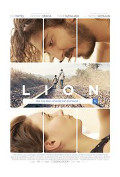
Directed by
Garth Davis
118 minutes
Rated PG
Reviewed by
Bernard Hemingway

Lion
Synopsis: A five-year-old Indian boy (Sunny Pawar) gets lost on the streets of Calcutta, thousands of kilometres from home and is eventually adopted by an Australian couple, Sue and John Brierley (Nicole Kidman and David Wenham). 25 years later he decided to find his lost family.
Lion is a worthy film based on the memoir "A Long Way Home" by Saroo Brierley whose real life story it tells.
The first part of the film introduces us to a young Saroo and his older brother, Guddu (Abhishek Bharate) with cinematographer Greig Fraser making excellent use of the widescreen format to establish the boys’ direly poor but nevertheless happy childhood with their single mother (Priyanka Bose) in rural Central India. It is a scrubby region traversed by the long trains which are a prominent motif in Saroo’s story, eventually taking him, involuntarily, 1600 kilometres away to Calcutta where he becomes just another street urchin. The depiction of the teeming Dickensian chaos of that city contrasted with the instinctual bravery of little Saroo to survive its harshness is the highpoint of the film.
It fares less when once Saroo arrives in Tasmania. After introducing the boy not only to Western plenitude but the awful ‘80s décor and Nicole Kidman’s daggy wardrobe and wigs, we get a “20 years later” sur-title and Dev Patel takes over the Saroo role. It is here that the film really struggles to find enough dramatic heft to justify the big screen format. A secondary strand involving Saroo’s adopted brother, Mantosh (Divian Ladwa), a boy with serious psychological issues, is only sketched in whilst, more grievously, a romantic relationship with a young woman (Rooney Mara) never really acquires significance within the narrative and only serves programatically to overload the emotional conflicts Saroo is burdened with as he becomes increasingly obsessed with finding his mother and brother. (Apropos of this, given that young Saroo claimed to have come from “Ganestelay”, and it is a fair guess that as a five year-old he was mis-pronouncing the name, how hard would it have been to look for homophonic place names, if not in the mid-‘80s then certainly in the days of Google? This is especially anomalous as Saroo uses the internet to access historic train timetables. Still, the film claims to be based on a true story so presumably what we see is, more or less, what happened).
Whilst the passage of time is an important aspect to the story with each day, of necessity, removing Saroo further from his origins and Davis clearly want us appreciate this, some judicious pruning would have been advisable, particularly as there are many shots that are repeated or held too long (and one with a major continuity problem involving Saroo’s wall maps which at one point are torn down then subsequently reappear intact). Also, at times the film comes dangerously close to the sentimental, most notably in the climactic reunion between mother and son, a perfect instance of when less would have been more (a much more economical coda showing us the subsequent meeting of the two mothers in real life is genuinely moving).
On the basis of The Man Who Know Infinity I was fearful of another pietistic turn from Patel but he gives an impressively natural performance as a young man who has grown up in Australia whilst Sunny Pawar is quite marvellous as the younger Saroo. Kidman is, as ever, effective in what is perhaps the most interesting part of the story, that of the Brierleys and their motivation for adopting two Indian orphans. Disappointingly Wenham, who overdoes the ‘Strine, gets to make no real contribution in this respect.
There is much of value in Lion, an ambitious film with, at its heart, as the end credits amply demonstrate, a committed concern for the huge number (over 11 million) of homeless Indian children. Perhaps with less detailed attention to the facts of its story and a little more thought about their dramatization the message would have had greater impact.

Want more about this film?


Want something different?




